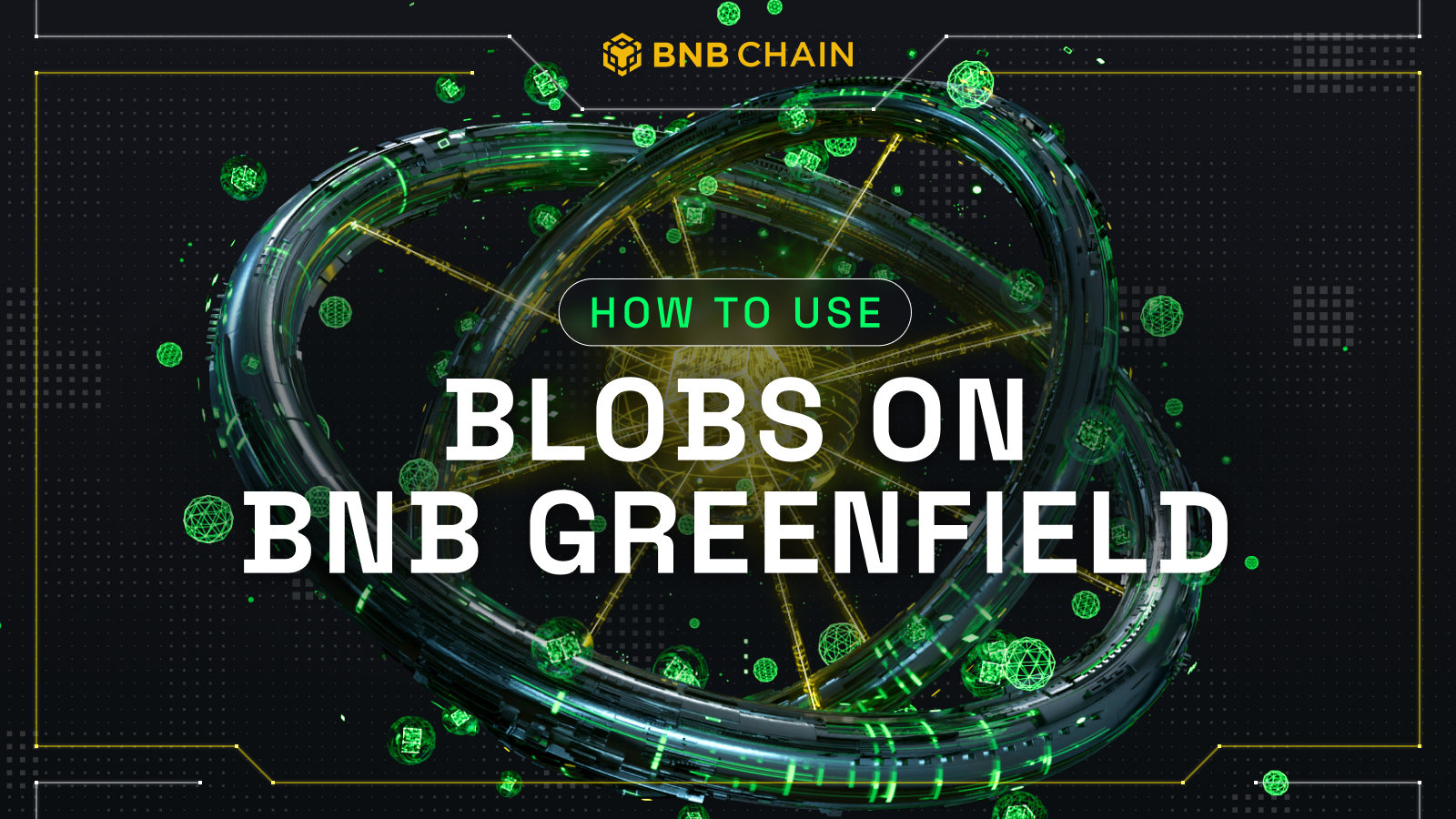Chains
BNB Beacon Chain
BNB ecosystem’s staking & governance layer
Developers
Solutions
Tokenization
Get Your Business Into Web3
Ecosystem
Community
How To Use Blobs On BNB Greenfield

BNB Greenfield revolutionizes decentralized storage and data management with its latest addition, "BlobHub." This data archive layer enhances the efficiency of Layer 2 blockchains and decentralized applications (Dapps) by optimizing large-scale data storage. BlobHub ensures data integrity, accessibility, and longevity—key factors in a data-intensive blockchain environment.
What is Blob Storage?
"Blobs," as introduced in BEP 336, stands for "Blob-Carrying Transactions," which represent an advancement in handling large data on the BNB Smart Chain (BSC). Each blob is a temporary memory segment capable of storing up to 128 KB. This innovative approach is designed to efficiently manage network storage by ensuring that these blobs only occupy space temporarily, ultimately reducing storage demands and lowering the cost for users in terms of gas fees.
The use of blobs streamlines the transaction verification process. Instead of verifying each transaction, the network confirms the accuracy of the data within the blob. This reduces the computational burden and speeds up transactions. Blobs are especially beneficial for opBNB, the layer 2 network using BSC for data storage while leveraging its security features. This strategy efficiently manages data bloat, maintaining data integrity and accessibility during its lifecycle on the blockchain.
How Does BlobHub Operate in BNB Greenfield?
BlobHub operations in BSC are integral to managing and synchronizing large-scale data across blockchain networks. The Hub comprises the blob-syncer, api-server, and bundle-service.
- The blob-syncer fetches and stores blobs from Ethereum and other blockchains into Greenfield, ensuring data from various sources is integrated within BSC.
- The api-server processes historical blob queries from users
- The bundle-service aggregates, validates, and efficiently uploads blobs to Greenfield.
The synchronization process includes a post-verification step that scans all uploaded blobs for consistency and integrity, preventing data discrepancies and duplicate uploads with strict naming constraints.
BSC's architecture requires a specific strategy for blob management that differs from Ethereum's approach. This ensures that all blob operations are directly handled by the BSC client for seamless integration. Unlike Ethereum, BSC uses a dynamic gas pricing mechanism for blobs, with set minimum and maximum thresholds to control transaction costs. Additionally, BSC does not burn the base fee associated with blobs, reflecting its unique token burn mechanism and economic strategy.
Utilizing BlobHub on BNB Greenfield
Accessing and using BlobHub is straightforward. Developers and users can interact with the BlobHub through a well-documented API that complies with the Beacon Chain API spec. Here’s how users can leverage BlobHub:
- Direct Access for Immediate Needs: In scenarios where the bundle service might be inaccessible, users can directly access blobs stored in Greenfield. This direct access ensures that data is always available, regardless of any service disruptions.
- Querying Blobs: Users can query the stored blobs using the API, which supports a range of commands and queries, allowing for flexible data handling.
The Impact of BlobHub
BlobHub revolutionizes how data is handled in blockchain environments by offering:
- Reduced Costs: By archiving data efficiently, BlobHub helps reduce the costs associated with large data volumes.
- Enhanced Scalability: With blob storage, BNB Greenfield can handle more transactions and data without significant slowdowns or increased costs.
- Improved Data Integrity: The verification processes and data handling methods ensure that the data remains unchanged and secure
Conclusion
By providing a scalable, secure, and cost-effective solution for data handling through blob storage, BNB Greenfield is setting a new standard for blockchain infrastructure. This initiative boosts the growth and scalability of the BNB ecosystem and enhances user experiences, making it an essential development for anyone involved in the industry.
Follow us to stay updated on everything BNB Chain
Website | Twitter | Telegram | Facebook | dApp Store | YouTube | Discord | LinkedIn | Build N' Build Forum